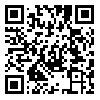Sun, Feb 15, 2026
[Archive]
Volume 10, Issue 3 (Summer 2024)
JCCNC 2024, 10(3): 155-166 |
Back to browse issues page
Download citation:
BibTeX | RIS | EndNote | Medlars | ProCite | Reference Manager | RefWorks
Send citation to:



BibTeX | RIS | EndNote | Medlars | ProCite | Reference Manager | RefWorks
Send citation to:
Malekitabar A, Khodabakhshi-Koolaee A, Falsafinejad M R, Vakili S. Exploring Spouse Selection Concerns Among Men With Visual Impairments. JCCNC 2024; 10 (3) :155-166
URL: http://jccnc.iums.ac.ir/article-1-567-en.html
URL: http://jccnc.iums.ac.ir/article-1-567-en.html
Alireza Malekitabar1 

 , Anahita Khodabakhshi-Koolaee *2
, Anahita Khodabakhshi-Koolaee *2 

 , Mohammad Reza Falsafinejad3
, Mohammad Reza Falsafinejad3 

 , Samira Vakili1
, Samira Vakili1 



 , Anahita Khodabakhshi-Koolaee *2
, Anahita Khodabakhshi-Koolaee *2 

 , Mohammad Reza Falsafinejad3
, Mohammad Reza Falsafinejad3 

 , Samira Vakili1
, Samira Vakili1 

1- Department of Counseling, Faculty of Humanities and Social Sciences, Science and Research Branch, Islamic Azad University, Tehran, Iran.
2- Department of Psychology and Educational Sciences, Faculty of Humanities, Khatam University, Tehran, Iran. ,a.khodabakhshid@khatam.ac.ir
3- Department of Assessment and Measurement, Faculty of Psychology and Educational Sciences, Allameh Tabataba'i University, Tehran, Iran.
2- Department of Psychology and Educational Sciences, Faculty of Humanities, Khatam University, Tehran, Iran. ,
3- Department of Assessment and Measurement, Faculty of Psychology and Educational Sciences, Allameh Tabataba'i University, Tehran, Iran.
Abstract: (2409 Views)
Background: Choosing a proper spouse is one of a person’s most important decisions. Spouse selection among blind and visually impaired people is associated with numerous concerns. It is an emotional, social and sexual need that creates some changes in the lives of blind and visually impaired people. To this end, the present study explored spouse selection concerns among men with visual impairments (VI).
Methods: This study adopted a qualitative-descriptive phenomenological approach. The study participants were selected through purposive sampling among visually impaired men who were members of the blind and visually impaired association of Iran, Markazi Province, Arak Branch in 2023. The study data were collected through 17 semi-structured interviews and were analyzed using Colaizzi’s 7-step data analysis method.
Results: The analysis of the data showed that the spouse selection in blind and visually impaired men was associated with four main themes: “Negative feelings and disappointment in marriage,” “lack of support and financial resources,” “negative public stigma,” and “need for a mate.”
Conclusion: This study has provided insights into mate selection concerns of visually impaired men in Arak City, Iran. The lived experiences of blind and partially sighted men about marriage and love presented an accurate picture of their worries and concerns in choosing a spouse, which can help identify the concerns of this group in society.
Methods: This study adopted a qualitative-descriptive phenomenological approach. The study participants were selected through purposive sampling among visually impaired men who were members of the blind and visually impaired association of Iran, Markazi Province, Arak Branch in 2023. The study data were collected through 17 semi-structured interviews and were analyzed using Colaizzi’s 7-step data analysis method.
Results: The analysis of the data showed that the spouse selection in blind and visually impaired men was associated with four main themes: “Negative feelings and disappointment in marriage,” “lack of support and financial resources,” “negative public stigma,” and “need for a mate.”
Conclusion: This study has provided insights into mate selection concerns of visually impaired men in Arak City, Iran. The lived experiences of blind and partially sighted men about marriage and love presented an accurate picture of their worries and concerns in choosing a spouse, which can help identify the concerns of this group in society.
Type of Study: Research |
Subject:
Special
Received: 2023/12/17 | Accepted: 2024/04/20 | Published: 2024/08/1
Received: 2023/12/17 | Accepted: 2024/04/20 | Published: 2024/08/1
Send email to the article author
| Rights and permissions | |
 |
This work is licensed under a Creative Commons Attribution-NonCommercial 4.0 International License. |



